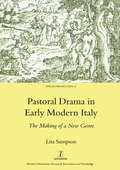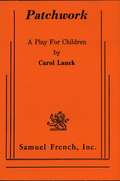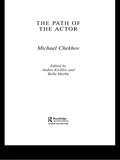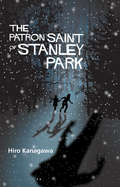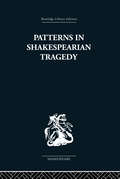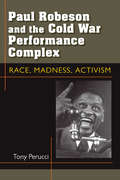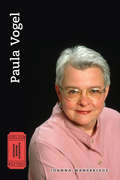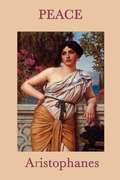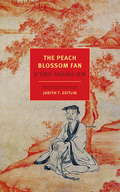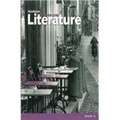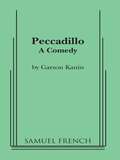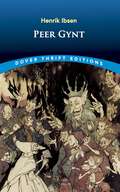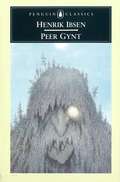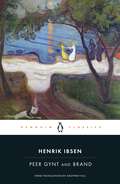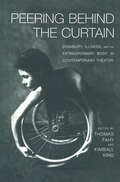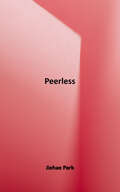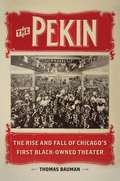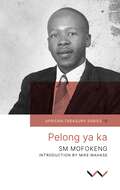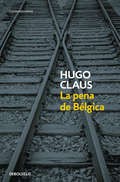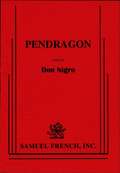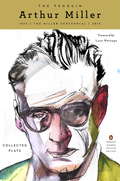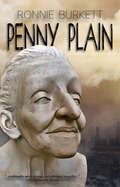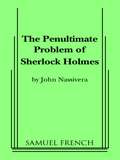- Table View
- List View
Pastoral Drama in Early Modern Italy: The Making of a New Genre
by Lisa Sampson"Emerging in Italy in the mid-sixteenth century, pastoral drama is one of the most characteristic genres of its time. Sampson traces its uneven development into the following century by exploring masterpieces by Tasso and Guarini, and many lesser known works, some by women writers. She examines the treatment of key themes of love, the Golden Age, and Nature and Art against the background of the textual and stage production of the plays. An investigation of critical writings associated with the genre further reveals its significance to the contemporary literary scene, by stimulating 'modernizing' attitudes towards the canon, as well as new enquiries into the function and possibilities of art."
Patchwork
by Carol LauckComedy / 2m, 2f, minimum / Flexible staging / A cleverly designed ensemble of old fashioned fables and contemporary foibles, Patchwork is stitched together with wit and wisdom. Fast paced, funny and thought provoking, each scene is visually and mentally stimulating. Promising at the start to ". . . wiggle your giggle and tickle your noodle", the actors play 41 roles in 14 scenes. Each scene is introduced by a patch ready to be sewn, with the completed quilt presented at the conclusion.
The Path Of The Actor
by Michael ChekhovThis is the first English translation of Michael Chekhov’s two-volume autobiography, combining The Path of the Actor (1927) and extensive extracts from his later volume Life and Encounters. Full of illuminating anecdotes and insightful observations involving prominent characters from the MAT and the European theatre of the early twentieth century, Chekhov takes us through events in his acting career and personal life, from his childhood in St. Petersburg until his emigration to Latvia and Lithuania in the early 1930s. Accompanying Chekhov's witty, penetrating, and immensely touching accounts are extensive and authoritative notes compiled by leading Russian Chekhov scholar, Andrei Kirillov. Anglo-Russian trained actor Bella Merlin provides a useful hands-on overview of how the contemporary practitioner might utilise and develop Chekhov's ideas. Chekhov was arguably one of the greatest actors of the twentieth century. His life made a huge impact on his profession, and his actor-training techniques inspired many a Hollywood legend – including such actors as Anthony Hopkins and Jack Nicholson -while his books outlining his teaching methods and philosophy of acting are still bestsellers today The Path of the Actor is an extraordinary document which allows us unprecedented access into the life, times, mind and soul of a truly extraordinary man.
The Patron Saint of Stanley Park
by Hiro KanagawaSiblings Josh and Jennifer are coping with the loss of their father, who disappeared in a floatplane accident last Christmas Eve. Their mother wants to pretend everything is normal, while Jennifer is angry and isolated and Josh scours the Internet for proof that their father is still alive. So on Christmas Eve, when the children are supposed to catch a bus to their uncle's place, they go to Stanley Park instead and make their way to Prospect Point to honour their father's memory. When a catastrophic windstorm thwarts their plans, Skookum Pete, a strange vagabond who roams the park, takes them to a fantastical bunker beneath the park, where they experience wondrous visions that help them understand the truth about their father.
Patterns in Shakespearian Tragedy (Methuen Library Reprints)
by Irving RibnerFirst published in 1960. Patterns in Shakespearian Tragedy is an exploration of man's relation to his universe and the way in which it seeks to postulate a moral order. Shakespeare's development is treated accordingly as a growth in moral vision. His movement from play to play is carefully explored, and in the treatment of each tragedy the emphasis is on the manner in which its central moral theme shapes the various elements of drama
Paul Robeson and the Cold War Performance Complex
by Tony PerucciActor and singer Paul Robeson's performances inOthello,Show Boat, andThe Emperor Jonesmade him famous, but his midcentury appearances in support of causes ranging from labor and civil rights to antilynching and American warmongering made him notorious. When Robeson announced at the 1949 Paris Peace Conference that it was "unthinkable" for blacks to go to war against the Soviet Union, the mainstream American press declared him insane. Notions of Communism, blackness, and insanity were interchangeably deployed during the Cold War to discount activism such as Robeson's, just a part of an array of social and cultural practices that author Tony Perucci calls the Cold War performance complex. Focusing on two key Robeson performances---the concerts in Peekskill, New York, in 1949 and his appearance before the House Committee on Un-American Activities in 1956---Perucci demonstrates how these performances and the government's response to them are central to understanding the history of Cold War culture in the United States. His book provides a transformative new perspective on how the struggle over the politics of performance in the 1950s was also a domestic struggle over freedom and equality. The book closely examines both of these performance events as well as artifacts from Cold War culture---including congressional documents, FBI files, foreign policy papers, the popular literature on mental illness, and government propaganda films---to study the operation of power and activism in American Cold War culture.
Paula Vogel
by Joanna MansbridgePaula Vogel's plays, including the Pulitzer-prizewinning How I Learned to Drive, initiate a conversation with contemporary culture, staging vexed issues like domestic violence, pornography, and AIDS. She does not write "about" these concerns, but instead examines how they have become framed as "issues"-as sensationalized topics-focusing on the histories and discourses that have defined them and the bodies that bear their meanings. Mobilizing campy humor, keen insight, and nonlinear structure, her plays defamiliarize the identities and issues that have been fixed as "just the way things are." Vogel crafts collage-like playworlds that are comprised of fragments of history and culture, and that are simultaneously inclusive and alienating, familiar and strange, funny and disturbing. At the center of these playworlds are female characters negotiating with the images and discourses that circumscribe their lives and bodies. In this, the first book-length study of Vogel and her work, Joanna Mansbridge explores how Vogel's plays speak back to the canon, responding to and rewriting works by William Shakespeare, Edward Albee, Sam Shepard, and David Mamet, rearranging their plots, revising their conflicts, and recasting their dramatis personae. The book examines the theories shaping the playwright and her plays, the production and reception of her work, and the aesthetic structure of each play, grounding the work in cultural materialist, feminist and queer theory, and theater and performance studies scholarship.
Peace
by AristophanesA rollicking attack on war-makers, the farmer-hero makes his famous trip to heaven on a dung beetle to discuss the issues with Zeus.
The Peach Blossom Fan
by Chen Shih-Hsiang Cyril Birch K'Ung Shang-Jen Judith T. Zeitlin Harold ActonA tale of battling armies, political intrigue, star-crossed romance, and historical cataclysm, The Peach Blossom Fan is one of the masterpieces of Chinese literature, a vast dramatic composition that combines the range and depth of a great novel with the swift intensity of film. In the mid-1640s, famine sweeps through China. The Ming dynasty, almost 300 years old, lurches to a bloody end. Peking falls to the Manchus, the emperor hangs himself, and Ming loyalists take refuge in the southern capital of Nanking. Two valiant generals seek to defend the city, but nothing can overcome the corruption, decadence, and factionalism of the court in exile. The newly installed emperor cares for nothing but theater, leaving practical matters to the insidious Ma Shih-ying. Ma's crony Juan Ta-ch'eng is as unscrupulous an operator as he is sophisticated a poet. He diverts resources from the starving troops in order to stage a spectacular production of his latest play. History, however, has little time for make-believe, though the earnest members of the Revival Club, centered on the handsome young scholar Hou Fang-yü and his lover Fragrant Princess, struggle to discover a happy ending.
Peccadillo
by Garson KaninComedy / Garson Kanin / 4 m, 2 f / 2 Interiors / Maestro Vito De Angelis, an egomaniacal but charming conductor, is under contract to a major publisher to deliver his autobiography. The publisher has paid a huge advance and Vito has just fired his fifth ghost writer. The publisher sends pretty Iris Peabody, knowing that Vito is a sucker for the ladies, to gain his cooperation as she ghost writes the book. The stratagem works, a fact that distresses Mrs. Vito, former opera star Rachel Garland. She hires a handsome young ghost writer to write her autobiography: Mrs. Maestro. Christopher Plummer, Glynis Johns and Kelly McGillis starred in this light hearted romp by the author of Born Yesterday. / "Those who adore well constructed comedy will go berserk." Buffalo News.
Peer Gynt (Dover Thrift Editions #2)
by Henrik IbsenAmong the masterpieces of world literature, this early verse drama by the celebrated Norwegian playwright humorously yet profoundly explores the virtues, vices, and follies common to all humanity — as represented in the person of Peer Gynt, a charming but irresponsible young peasant. Based on Norwegian folklore and Ibsen’s own imaginative inventions, the play relates the roguish life of the world-wandering Peer, who finds wealth and fame — but never happiness — although he is redeemed by love in the end.As the play opens the young farmer attends a wedding and meets Solveig, the woman who is eventually to be his salvation. However, the rascally Peer then kidnaps the bride and later abandons her in the wilderness. This dismal performance is followed by a string of adventures (many of which do not reflect well on Peer) in many lands. After these soul-chilling exploits, an old and embittered Peer returns to Norway, eventually finding solace in the arms of the faithful Solveig.Like other early Ibsen plays, such as Brand (1866) and Emperor and Galilean (1874), the work is imbued with poetic mysticism and romanticism, and in Peer we find a rebellious central character in search of an ultimate truth that always seems just out of reach. In this sense Peer can be seen as an alter ego of Ibsen himself, whose lifelong search for artistic and moral certainties resulted in the great later plays (Hedda Gabler, The Wild Duck, An Enemy of the People, etc.) upon which his reputation chiefly rests. This rich, poetic version of Peer Gynt is considered the standard translation.
Peer Gynt: A Dramatic Poem (Classics)
by Henrik Ibsen Peter WattsThis high-spirited poetical fantasy, based on Norwegian folklore, is the story of an irresponsible, lovable hero. After its publication, Ibsen abandoned the verse form for more realistic prose plays.
Peer Gynt and Brand
by Henrik IbsenA new Penguin edition of Ibsen's two great verse plays, in masterful versions by one of our greatest living poets, Geoffrey Hill. These two powerful and contrasting verse dramas by Ibsen made his reputation as a playwright. The fantastical adventures of the irrepressible Peer Gynt - poet, idler, procrastinator, seducer - draw on Norwegian folklore to conjure up mountains, kidnappings, shipwrecks and trolls in an exuberant examination of truth and the self; while Brand, an unsparing vision of an idealistic priest who lives by his steely faith, explores free will and sacrifice. This volume brings together the poet Geoffrey Hill's acclaimed stage version of Brand with a new poetic rendering of Peer Gynt, published for the first time.This Penguin edition includes an interview with Geoffrey Hill about recreating Ibsen in English, an introduction by Janet Garton and editorial materials by Tore Rem.
Peering Behind the Curtain: Disability, Illness, and the Extraordinary Body in Contemporary Theatre (Studies in Modern Drama #18)
by Thomas Fahy Kimball KingFirst Published in 2002. Routledge is an imprint of Taylor & Francis, an informa company.
Peerless
by Jiehae ParkAsian-American Twins M and L have given up everything to get into The College. So when D, a one-sixteenth Native American classmate, gets "their" spot instead, they figure they've got only one option: kill him. A darkly comedic take on Shakespeare's Macbeth about the very ambitious and cut-throat world of high school during college admissions.
The Pekin: The Rise and Fall of Chicago's First Black-Owned Theater
by Thomas BaumanIn 1904, political operator and gambling boss Robert T. Motts opened the Pekin Theater in Chicago. Dubbed the "Temple of Music," the Pekin became one of the country's most prestigious African American cultural institutions, renowned for its all-black stock company and school for actors, an orchestra able to play ragtime and opera with equal brilliance, and a repertoire of original musical comedies. A missing chapter in African American theatrical history, Bauman's saga presents how Motts used his entrepreneurial acumen to create a successful black-owned enterprise. Concentrating on institutional history, Bauman explores the Pekin's philosophy of hiring only African American staff, its embrace of multi-racial upper class audiences, and its ready assumption of roles as diverse as community center, social club, and fundraising instrument. The Pekin's prestige and profitability faltered after Motts' death in 1911 as his heirs lacked his savvy, and African American elites turned away from pure entertainment in favor of spiritual uplift. But, as Bauman shows, the theater had already opened the door to a new dynamic of both intra- and inter-racial theater-going and showed the ways a success, like the Pekin, had a positive economic and social impact on the surrounding community.
Pelong ya Ka (African Treasury Series #1)
by Sophonia Machabe MofokengPelong ya Ka, a collection of essays and sketches in Sotho was first published in 1962 in the Bantu Treasury Series imprint of Witwatersrand University Press. S. Machabe Mofokeng is regarded as one of the greatest essayist and dramatist in Southern Sotho. His first book, Senkatana (a play) was published in 1952.Pelong ya Ka comprises 20 essays which range from meditative, descriptive, and narrative to polemic style, with the tone of voice characterised by melancholy, humour, and satire. The essays span over a wide range of themes, as suggested by their titles, e.g. Pelo (The heart), Bodutu (‘Solitude’), Death (‘Lefu’), Nako (‘Time’), Pampiri (‘Paper’), Ho kganna mmotokara (‘Driving an automobile’), Sepetlele (‘Hospital’), Lenyalo (‘Matromony’), and Boqheku (‘Old age’). Nhlanhla Maake says of this collection “Mofokeng’s essays fuse simplicity with dept.” Pelong ya Ka is part of the African Treasury Series published by Wits University Press.
La pena de Bélgica
by Hugo Claus«Hugo Claus no necesitaba ningún maestro, él era un maestro.»CEES NOOTEBOOMAmbientada en Bélgica durante los últimos años del III Reich, esta novela narra la adolescencia de Louis Seynaeve, hijo de una familia pequeñoburguesa y ultraconservadora, orgullosa de su propia inanidad. Con el paso de los años, Louis, desencantado, abandona los mitos de la niñez y descubre la naturaleza hipócrita del mundo adulto. Obra de factura clásica y proporciones épicas, polémica, hilarante y cruda a partes iguales, La pena de Bélgica es uno de los mayores monumentos de la literatura europea.Traducción de M. C. Bartolomé Corrochano y P. J. van de Paverd
Pendragon
by Don NigroComedic Drama / 6m, 5f, with doubling / Unit Set / In this robust and compelling tale commissioned and produced by the Idaho Shakespeare Festival, John Rhys Pendragon is at Guernica during the Fascist bombing in 1937. His memories take him back to 1910 and conjure up Mark Twain, Teddy Roosevelt, James J. Jeffries and Ernest Hemingway as the play pieces together his remarkable life, recalls his three lost loves and vividly portrays colorful characters he has interviewed. This unique American love story is part of the author's cycle the Pendragon Plays.
The Penguin Arthur Miller
by Lynn Nottage Arthur MillerTo celebrate the centennial of his birth, the collected plays of America's greatest twentieth-century dramatist in a beautiful bespoke hardcover edition In the history of postwar American art and politics, Arthur Miller casts a long shadow as a playwright of stunning range and power whose works held up a mirror to America and its shifting values. The Penguin Arthur Miller celebrates Miller's creative and intellectual legacy by bringing together the breadth of his plays, which span the decades from the 1930s to the new millennium. From his quiet debut, The Man Who Had All the Luck, and All My Sons, the follow-up that established him as a major talent, to career hallmarks like The Crucible and Death of a Salesman, and later works like Mr. Peters' Connections and Resurrection Blues, the range and courage of Miller's moral and artistic vision are here on full display.This lavish bespoke edition, specially produced to commemorate the Miller centennial, is a must-have for devotees of Miller's work. The Penguin Arthur Miller will ensure a permanent place on any bookshelf for the full span of Miller's extraordinary dramatic career.The Penguin Arthur Miller includes: The Man Who Had All the Luck, All My Sons, Death of a Salesman, An Enemy of the People, The Crucible, A View from the Bridge, After the Fall, Incident at Vichy, The Price, The Creation of the World and Other Business, The Archbishop's Ceiling, The American Clock, Playing for Time, The Ride Down Mt. Morgan, The Last Yankee, Broken Glass, Mr. Peters' Connections, and Resurrection Blues.From the Hardcover edition.
Penny Plain
by Ronnie BurkettHumanity is facing extinction, and Penny Plain, elderly and blind, can only sit and wait for the end. After a heartbreaking farewell from her dog, Geoffrey, who leaves to live as a man, Penny faces the inevitable by herself. But she isn't alone for long as a cast of characters, including a serial killer, a cross-dressing banker, and talking dogs barge into her boarding house in pursuit of last chances and an escape from the hostile world outside. With this steady invasion, Penny bears witness to the funny and chilling consequences as mother earth cleans house and reclaims her ground.
The Penultimate Problem Sherlock Holmes
by John NassiveraMystery Drama \ 6 m, 3 f \ Int. \ This play about the famous detective has Holmes venturing into the occult where, during a seance, he is warned that he is about to meet his maker. The play has Holmes, Waston and Prof. Moriarty meet their maker, Sir Arthur Conan Doyle, who wishes to end their existence literally with the final stroke of his pen. Holmes cannot accept the fact that he is the product of another's imagination, a mere pawn of another man's genius. Who is the creator and who the pawn becomes the central question as Holmes and the others threaten their creator with the death to which he has sentenced them. \ "A must for all the fans of Sherlock Holmes stories, the play contains startling twists and turns that keep the audience on the edge of their seats." The Resorter.
